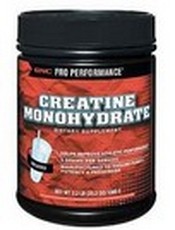Creatine Monohydrate Side Effects
Creatine is an amino acid that is naturally occurring in the body found in the muscle tissues. Creatine works by providing energy for the muscles. The creatine supply is mostly found in the skeletal muscles. Some of the creatine may be found in the testes, blood and the heart. Creatine is mostly taken from food sources such as red meat. However, dietary sources may only be present in trace amounts. Due to this, creatine supplementation is sometimes needed. Creatine supplements are in the form of creatine monohydrate.

Uses and Advantages of Creatine Monohydrate
Creatine is used for ATP or energy production. Creatine monohydrate is commonly used by body builders and sports enthusiasts. Creatine monohydrate is used to improve weight lifting by increasing the energy of the skeletal muscles. It also buffers the production of lactic acid, thereby enhances the endurance of individuals taking it. It is also beneficial in delaying fatigue just by increasing the muscle strength. Creatine monohydrate seems to provide the body up to 2 to 3 times the benefit of a high protein diet in improving the muscles.
Aside from these, creatine tends to increase the fluid inside the cells leading to firmer and bigger muscles, termed as cell volumization. Cell volumization is different from water retention. Cell volumization tends to improve gaining of muscle mass. Creatine usually produces beneficial effects in the first week of use. Creatine monohydrate, unlike other body building drugs, is approved by athletic associations for use by athletes.
Aside from its effects on body builders and athletes, Creatine monohydrate has been found to be beneficial for the management of the following conditions:
- Congestive heart failure
- Arthritis
- Parkinson’s disease
- Disuse and gyrate atrophy
- Huntington’s disease
- McArdle’s disease
- Neuromuscular diseases
- Muscular dystrophy
- Mitochondrial disease
- Amyotrophic lateral sclerosis
Creatine monohydrate also has neuroprotective functions; thereby improving the cognitive abilities of people.
Creatine Monohydrate Side effects
Creatine monohydrate may also produce side effects just like any other medications. However, it can be minimized with proper use and dosing. The use of 5 to 20 grams of creatine per day seems to prevent Creatine monohydrate side effects. The following are the possible Creatine monohydrate side effects:
1. Allergies
People with certain allergies may also be hypersensitive to creatine monohydrate as a Creatine monohydrate side effect. It is important to seek consult from a physician regarding creatine use when you suffer from certain allergies. Voltaren side-effects may also lead to allergic reactions.
2. Asthma
Those who are allergic to creatine may also develop asthma reactions as Creatine monohydrate side effects. Asthma may lead to difficulty of breathing and wheezing. When you are allergic to creatine, it is better to avoid its use and better get creatine from natural food sources.
3. Muscle cramping
Studies also have shown the possibility of muscles cramping because of the effects of fluid movement in the muscle cells that may also affect the electrolytes. Nevertheless, some studies have also showed that muscle cramping is a rare Creatine monohydrate side effect.
4. Interstitial nephritis
Creatine is metabolized in the body and turns into its byproduct as creatinine. When excessive levels of creatinine are present, it may increase the workload of the kidneys in eliminating this byproduct as a Creatine monohydrate side effect. Huge amounts of creatine intake may eventfully lead to kidney problems. Intake of recommended dosage is essential to prevent kidney problems.
5. Altered liver function
There may also be problems in the liver functioning of individuals taking create monohydrate as a Creatine monohydrate side effect. Watch out for yellowish skin and sclera, which may indicate liver damage.
6. Loss of muscle strength and mass
Discontinuing creatine monohydrate may lead to temporary loss of muscle strength and muscle mass as a result of decreased fluids inside the muscles. It is important to differentiate real muscle mass from cell volumization in order not to be disappointed when you suddenly lose your muscles when you stop taking creatine monohydrate.
Other less serious Creatine monohydrate side effects include dizziness, stomach upset, diarrhea, and sudden weight gain. Creatine is also believed to increase risk for cancer especially those who take excessive dose of creatine monohydrate. In order to prevent these Creatine monohydrate side effects, it is essential to adhere to its recommended daily dosages.